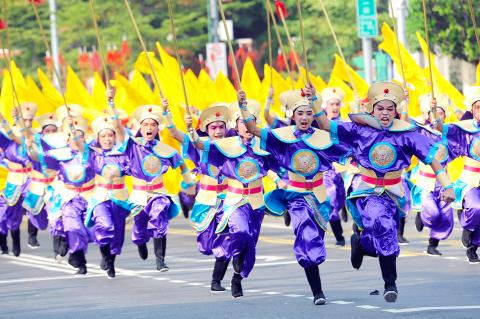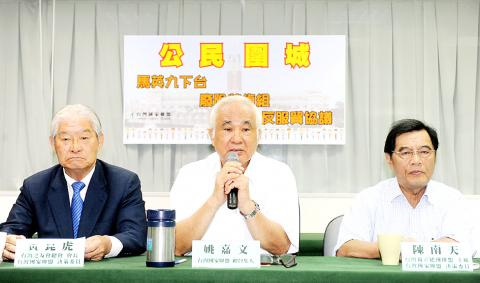Taiwan Nation Alliance convener Yao Chia-wen (姚嘉文) yesterday said that members of the alliance’s pro-localization groups will take part in a major rally against President Ma Ying-jeou (馬英九) to be staged by activist group Citizen 1985 on Double Ten National Day tomorrow.
“The alliance has three demands: that Ma step down to take responsibility for causing political turmoil; that the Special Investigation Division [SID] of the Supreme Prosecutors’ Office be abolished for colluding with the president in conducting illegal wiretapping; and that the cross-strait service trade pact be blocked,” Yao said.
The first two demands referred to a wiretapping scandal involving Ma, the SID and Prosecutor-General Huang Shih-ming (黃世銘) that has snowballed into a political storm.

Photo: CNA
Ma’s critics have accused him of breaching constitutional information confidentiality regulations by discussing with Huang in person and via telephone details of the SID’s wiretap-based investigation into alleged improper lobbying on behalf of Legislative Speaker Wang Jin-pyng (王金平) before the case was concluded on Sept. 5.
The rally is to begin with a flag-raising ceremony at 10:10am in front of the Legislative Yuan, during which a specially designed flag will be hoisted in place of the national flag to signify the awakening of citizens’ power.
The Citizen 1985 is to call on the government to reinforce direct democracy by lowering the referendum threshold; rationalize the recall mechanism by lowering the threshold to recall elected officials; let people’s voices be heard by lowering the threshold for a party to receive public subsidies and be awarded a legislator-at-large seat; and say no to back-room deals by renegotiating the cross-strait agreement with China.

Photo: Lo Pei-der, Taipei Times
Taiwan Society president Chang Yen-hsien (張炎憲) said the service trade deal and the cross-strait negotiations on setting up representative offices were parts of Ma’s ploy to use the “one China” framework to wrap up Taiwan as a gift to China.
“We must work together to block the agreement to protect the people of Taiwan,” Chang said.
Taiwan Friends Association president Huang Kun-hu (黃崑虎) said lawmakers should abolish agencies like the SID that were established by an autocratic government for the purpose of cementing its power.
Huang also warned of the potential negative impact that cross-strait treaty could have on the nation’s underprivileged minorities.
Separately yesterday, representatives from several environmentalists groups in Taipei said they are planning to stage an anti-nuclear rally in front of the legislature tomorrow morning to demand the government halt the construction of the Fourth Nuclear Power Plant in New Taipei City’s (新北市) Gongliao District (貢寮).
“Only when we become a nuclear-free nation will we dare to celebrate National Day, because with nuclear power plants in operation, we are afraid of national disasters,” Green Party Taiwan member Pan Han-shen (潘翰聲) said.
The radioactive waste produced by the nation’s operating nuclear power plants is a serious problem for Taiwan, said Kuo Ching-lin (郭慶霖), chief executive of the Northern Coast Anti-Nuclear Action Alliance.
Kuo said that since the nation is unable to find a permanent depository site for the waste, many Taiwanese are worried that they will have to always live under the threat of radiation leakage accidents.

The Ministry of the Interior (MOI) is to tighten rules for candidates running for public office, requiring them to declare that they do not hold a Chinese household registration or passport, and that they possess no other foreign citizenship. The requirement was set out in a draft amendment to the Enforcement Rules of the Public Officials Election and Recall Act (公職人員選舉罷免法 ) released by the ministry on Thursday. Under the proposal, candidates would need to make the declaration when submitting their registration forms, which would be published in the official election bulletin. The move follows the removal of several elected officials who were

The Republic of China (ROC) is celebrating its 114th Double Ten National Day today, featuring military parades and a variety of performances and speeches in front of the Presidential Office in Taipei. The Taiwan Taiko Association opened the celebrations with a 100-drummer performance, including young percussionists. As per tradition, an air force Mirage 2000 fighter jet flew over the Presidential Office as a part of the performance. The Honor Guards of the ROC and its marching band also heralded in a military parade. Students from Taichung's Shin Min High School then followed with a colorful performance using floral imagery to represent Taiwan's alternate name

FOUR DESIGNATED AREAS: Notices were issued for live-fire exercises in waters south and northwest of Penghu, northeast of Keelung and west of Kaohsiung, they said The military is planning three major annual exercises across the army, navy and air force this month, with the navy’s “Hai Chiang” (海強, “Sea Strong”) drills running from today through Thursday, the Ministry of National Defense said yesterday. The Hai Chiang exercise, which is to take place in waters surrounding Taiwan, would feature P-3C Orion maritime patrol aircraft and S-70C anti-submarine helicopters, the ministry said, adding that the drills aim to bolster the nation’s offshore defensive capabilities. China has intensified military and psychological pressure against Taiwan, repeatedly sending warplanes and vessels into areas near the nation’s air defense identification zone and across

A Chinese takeover of Taiwan would severely threaten the national security of the US, Japan, the Philippines and other nations, while global economic losses could reach US$10 trillion, National Security Council Deputy Secretary-General Lin Fei-fan (林飛帆) wrote in an article published yesterday in Foreign Affairs. “The future of Taiwan is not merely a regional concern; it is a test of whether the international order can withstand the pressure of authoritarian expansionism,” Lin wrote in the article titled “Taiwan’s Plan for Peace Through Strength — How Investments in Resilience Can Deter Beijing.” Chinese President Xi Jinping’s (習近平) intent to take Taiwan by force